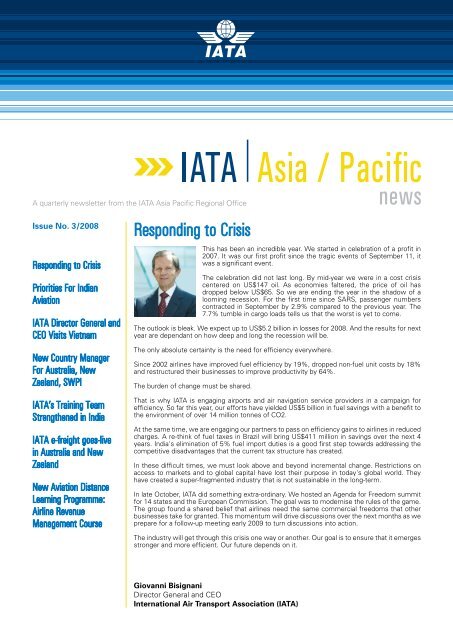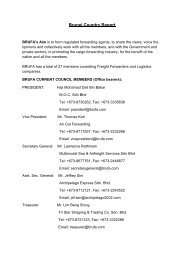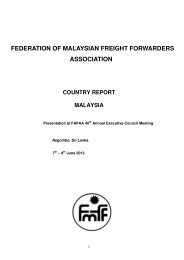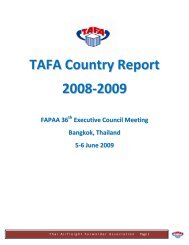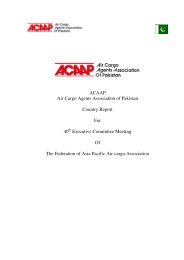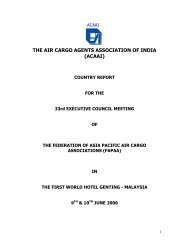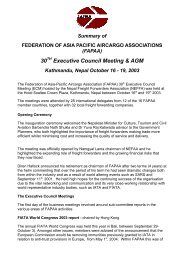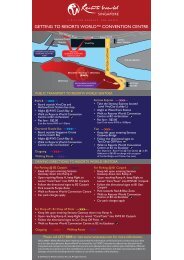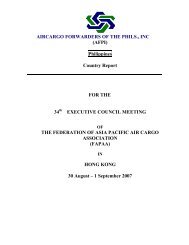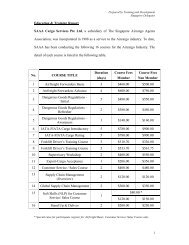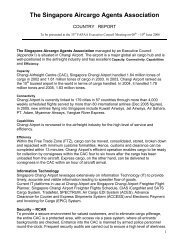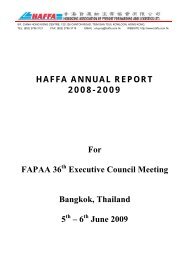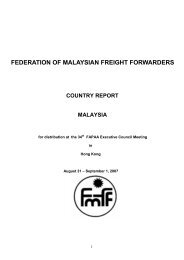IATA Regional Update - ASPAC newsletter - FAPAA
IATA Regional Update - ASPAC newsletter - FAPAA
IATA Regional Update - ASPAC newsletter - FAPAA
You also want an ePaper? Increase the reach of your titles
YUMPU automatically turns print PDFs into web optimized ePapers that Google loves.
A quarterly <strong>newsletter</strong> from the <strong>IATA</strong> Asia Pacific <strong>Regional</strong> Office<br />
Issue No. 3/2008<br />
Responding to Crisis<br />
Priorities For Indian<br />
Aviation<br />
<strong>IATA</strong> Director General and<br />
CEO Visits Vietnam<br />
New Country Manager<br />
For Australia, New<br />
Zealand, SWPI<br />
<strong>IATA</strong>’s Training Team<br />
Strengthened in India<br />
<strong>IATA</strong> e-freight goes-live<br />
in Australia and New<br />
Zealand<br />
New Aviation Distance<br />
Learning Programme:<br />
Airline Revenue<br />
Management Course<br />
Responding to Crisis<br />
This has been an incredible year. We started in celebration of a profit in<br />
2007. It was our first profit since the tragic events of September 11, it<br />
was a significant event.<br />
The celebration did not last long. By mid-year we were in a cost crisis<br />
centered on US$147 oil. As economies faltered, the price of oil has<br />
dropped below US$65. So we are ending the year in the shadow of a<br />
looming recession. For the first time since SARS, passenger numbers<br />
contracted in September by 2.9% compared to the previous year. The<br />
7.7% tumble in cargo loads tells us that the worst is yet to come.<br />
The outlook is bleak. We expect up to US$5.2 billion in losses for 2008. And the results for next<br />
year are dependant on how deep and long the recession will be.<br />
The only absolute certainty is the need for efficiency everywhere.<br />
Since 2002 airlines have improved fuel efficiency by 19%, dropped non-fuel unit costs by 18%<br />
and restructured their businesses to improve productivity by 64%.<br />
The burden of change must be shared.<br />
That is why <strong>IATA</strong> is engaging airports and air navigation service providers in a campaign for<br />
efficiency. So far this year, our efforts have yielded US$5 billion in fuel savings with a benefit to<br />
the environment of over 14 million tonnes of CO2.<br />
At the same time, we are engaging our partners to pass on efficiency gains to airlines in reduced<br />
charges. A re-think of fuel taxes in Brazil will bring US$411 million in savings over the next 4<br />
years. India's elimination of 5% fuel import duties is a good first step towards addressing the<br />
competitive disadvantages that the current tax structure has created.<br />
In these difficult times, we must look above and beyond incremental change. Restrictions on<br />
access to markets and to global capital have lost their purpose in today's global world. They<br />
have created a super-fragmented industry that is not sustainable in the long-term.<br />
In late October, <strong>IATA</strong> did something extra-ordinary. We hosted an Agenda for Freedom summit<br />
for 14 states and the European Commission. The goal was to modernise the rules of the game.<br />
The group found a shared belief that airlines need the same commercial freedoms that other<br />
businesses take for granted. This momentum will drive discussions over the next months as we<br />
prepare for a follow-up meeting early 2009 to turn discussions into action.<br />
The industry will get through this crisis one way or another. Our goal is to ensure that it emerges<br />
stronger and more efficient. Our future depends on it.<br />
Giovanni Bisignani<br />
Director General and CEO<br />
International Air Transport Association (<strong>IATA</strong>)
Priorities For Indian Aviation<br />
Indian carriers could post US$ 1.5 billion in losses in 2008, the largest outside the US.<br />
In his speech to the Confederation of Indian Industry (CII), Giovanni Bisignani identified<br />
three priority areas to help Indian carriers weather the perfect storm of high costs and<br />
falling demand.<br />
Costs:<br />
• Removing the 8% excise tax, implementing a standard 4% state tax for domestic fuel<br />
and greater transparency in overall pricing.<br />
• Removing the Service Tax on premium class tickets, overflight, landing and airport<br />
charges.<br />
• Setting up and staffing the Airport Economic Regulatory Authority (AERA) to achieve<br />
cost efficient infrastructure and bring India's charges in line with ICAO charges<br />
policies<br />
Infrastructure:<br />
• Infrastructure investments are urgently needed. While Delhi is moving towards the<br />
capability of handling 100 million passengers, the situation at Mumbai remains critical.<br />
Use the breathing space of the current downturn to plan for capacity in the 100 million<br />
passenger range for Mumbai.<br />
Standards:<br />
• The non-standard data transmission requirements for Advance Passenger Information<br />
(API) is an added cost burden that provides no additional benefit. This is a serious flaw<br />
for India's API at a time when increased cooperation is needed.<br />
“I am an India optimist, but<br />
my biggest concern is speed.<br />
Aviation is a fast-changing<br />
industry that is fueling much<br />
of the Indian economic<br />
success story. But the crisis<br />
is highlighting that India's<br />
decision making is too slow.<br />
India is not just a great market.<br />
It must also be a great leader.<br />
Minister Patel has done a great<br />
job in liberalising the industry<br />
and setting the wheels in motion<br />
for the rapid development of<br />
aviation in India. The benefits<br />
are clear: connecting business<br />
to markets, expanding tourism<br />
and creating jobs. Now it is<br />
the responsibility of entire<br />
government to follow up by<br />
addressing the issues of today's<br />
crisis with quick decisions<br />
based on global standards and<br />
build a solid platform for future<br />
expansion,” said Bisignani.<br />
<strong>IATA</strong> Director General and CEO Visits Vietnam<br />
<strong>IATA</strong>'s Director General and CEO, Giovanni Bisignani, made his first official visit to<br />
Vietnam in September 2008. As part of the visit, Bisignani met with Mr. Ho Nghia<br />
Dung, Minister of Transport, Mr. Pham Quy Tieu, Director General of the Civil Aviation<br />
Administration of Vietnam (CAAV) and Mr. Pham Ngoc Minh, CEO of Vietnam.<br />
“Vietnam has liberalised to expand market access and create new opportunities.<br />
It is investing infrastructure to meet future demand. Its recent elimination<br />
of the 15% import duties for jet fuel is a major step in the right direction,<br />
a move for other governments to follow. And the recent technical<br />
improvements in air traffic management using data link capabilities will<br />
improve efficiency and reduce delays. All of this is fully in line with the<br />
industry's need for dramatic change to meet the challenges of the global<br />
industry crisis,” said Bisignani.<br />
Bisignani also took note of challenges going forward. “As Vietnam moves<br />
forward with its tremendous expansion it is important to keep global standards<br />
as the backbone for industry development. For infrastructure that means regular<br />
consultation with airlines to meet the industry's needs and charging policies<br />
that are in line with ICAO standards fair, cost related, transparent and nondiscriminatory,”<br />
said Bisignani.
New Country Manager For<br />
Australia, New Zealand, SWPI<br />
Ian Lorigan joined <strong>IATA</strong> as Country<br />
Manager for Australia, New Zealand &<br />
South West Pacific Islands in August<br />
2008. As Country Manager, he will<br />
serve as the main point of contact for<br />
airlines, travel and cargo agents and<br />
industry service providers and relevant<br />
government agencies and regulatory<br />
authorities on matters related to <strong>IATA</strong>.<br />
Lorigan’s responsibilities will also include<br />
overseeing the management of the <strong>IATA</strong> Airline Agency<br />
settlement systems for travel and cargo agents.<br />
Prior to joining <strong>IATA</strong>, Lorigan worked for Singapore Airlines<br />
from 1990 – 2008, holding senior roles in Sales, Distribution<br />
and Marketing in Australia, Singapore and most recently, New<br />
York, as Vice President Eastern USA and South America.<br />
<strong>IATA</strong>’s Training Team<br />
Strengthened in India<br />
Alpana Chaturvedi has been appointed as<br />
<strong>IATA</strong>'s Manager, <strong>Regional</strong> Training Centre<br />
Delhi. Chaturvedi has the responsibility<br />
of setting up <strong>IATA</strong>'s <strong>Regional</strong> Training<br />
Centre, which is operational since 8<br />
September. For a start, 12 classroom<br />
courses are scheduled for 2009. She<br />
will also promote the <strong>IATA</strong> Training and<br />
Development Institute (ITDI) learning<br />
products in the South Asian region, and oversee the ITDI<br />
network of Authorised Training Centres.<br />
Prior to joining <strong>IATA</strong>, Chaturvedi was Head of Training &<br />
Business Development at the Bird Education Society for<br />
Travel & Tourism.<br />
<strong>IATA</strong> e-freight goes-live in Australia and New Zealand<br />
<strong>IATA</strong> e-freight is “live” in New Zealand and Australia,<br />
the fourth and fifth new locations respectively to<br />
deliver paper free cargo in 2008.<br />
The New Zealand e-freight went “live” on 14 October<br />
2008 on 2 trade lanes: New Zealand-Singapore, and<br />
New Zealand-Hong Kong. The New Zealand <strong>IATA</strong><br />
e-freight implementation was led by New Zealand<br />
Customs and supported by Singapore Airlines,<br />
Cathay Pacific, DHL Global Forwarding, Mainfreight<br />
International and MAF Biosecurity of New Zealand.<br />
The Australia e-freight became operational on<br />
22 October 2008 on 3 trade lanes: Australia-<br />
Singapore, Australia-New Zealand and Australia-The<br />
Netherlands. QANTAS led the Australia <strong>IATA</strong> e-freight<br />
implementation. Also involved in the implementation<br />
were Singapore Airlines, Cathay Pacific, British Airways,<br />
DHL Global Forwarding, Schenker, Fracht Australia,<br />
Australian Customs, the Australian Quarantine and<br />
Inspection Service, the Australian Federation of<br />
International Forwarders and the Customers Brokers<br />
and Forwarders Council of Australia.
New Aviation Distance Learning Programme:<br />
Airline Revenue Management Course<br />
The <strong>IATA</strong> Training and Development Institute (ITDI) helps thousands of people start or grow their career in the exciting world<br />
of aviation. The Aviation Training Programme is designed to give participants the skills and knowledge to maximise their career<br />
opportunities in a number of industry sectors - airline, cargo, airport and civil aviation segments, with the flexibility to study full or<br />
part time, from home, office or through one of <strong>IATA</strong>'s authorised training centres.<br />
The newest addition to the Aviation Course portfolio is the AIRLINE REVENUE MANAGEMENT COURSE.<br />
What is revenue management and why is it needed in the airline industry of today and tomorrow?<br />
As competition and various economic pressures increase, all airlines - regardless of business models - need to maximize revenues<br />
in order to remain in business and continue to grow. The course will introduce basic concepts and goals of airline revenue<br />
management. Some of the topics discussed are the factors that affect demand for airline seats, understanding how price is a<br />
strategic “lever” in demand management, the importance of booking class assignment and structure, and why scheduling is an<br />
important element of revenue management.<br />
For a complete outline of the content of the course and for<br />
information on how to register for the course, please visit<br />
http://iata.org/training/courses/talf51.htm.<br />
<strong>IATA</strong> Membership<br />
<strong>IATA</strong> members comprise some 230 airlines<br />
representing 93% of international scheduled air traffic.<br />
For more information, please log on to<br />
www.iata.org/Membership/airlines<br />
<strong>IATA</strong> Asia/Pacific Office<br />
111 Somerset Road, #14-05 Somerset Wing<br />
Singapore 238164<br />
Tel: 65 6438 4555<br />
Fax: 65 6438 4666<br />
website: www.iata.org<br />
Comments and feedback are welcome and should be sent to: chungs@iata.org


